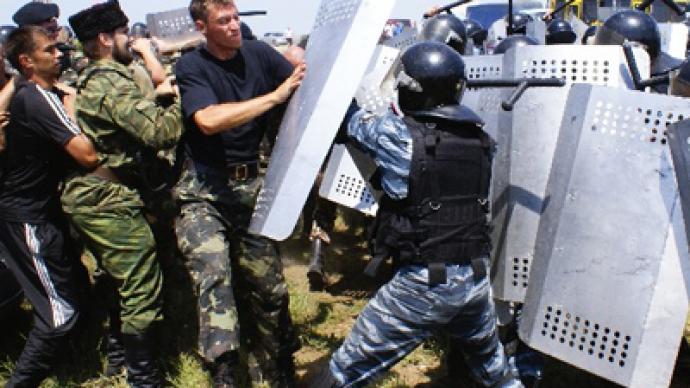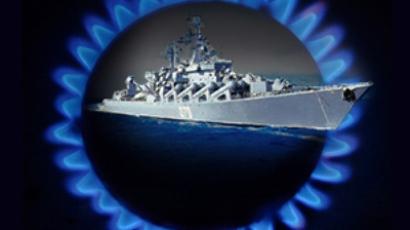Hundreds clash in Ukraine over Orthodox cross

An Orthodox cross has become a stumbling block between Russian Cossacks and authorities in Crimea, Ukraine’s autonomous republic. Hundreds have brawled on July 2 over the demolition of the cross set up in the city of Theodosia.
The clashes took place as the Cossacks tried to restore the cross, which had been knocked down by the local authorities, to its original position, but had to face hundreds of Ukrainian police, RBK-Ukraine news agency says.The cross was first set up at the entrance road to Theodosia on May 4, despite the authorities’ refusal to grant permission. The erection of the cross sparked the anger of Crimean Tatars and on July 1 the special police force pulled it down after a court decision. This triggered the Cossacks’ discontent. Cossack chieftain Sergey Yurchenko said that the decision to restore the cross was adopted early on July 2 in Theodosia. “The total of about 300 Cossacks and Orthodox believers paraded through Theodosia holding the cross,” he said. “But when we finally made it to the spot where the cross was originally set up, we were met by the special police force in full gear and with dogs. When we tried to pass, a fight started. The police outnumbered us greatly – there were approximately 600 of them,” stated Yurchenko. Yurchenko recollected that the fight was brutal and lasted for quite a long time. About 15 Cossacks were seriously hurt, with broken limbs and head injuries. The chieftain also said the police managed to detain ten people.
“Then the others blocked off the road for the patrol wagon in order to free their friends. All the detained were examined by a doctor who said they needed to be taken to hospital, and not to the police station. All the injured are now being taken care of,” said Yurchenko.Meanwhile, a report by the Ukrainian Ministry of Internal Affairs says there were just about 100 Cossacks and claims the Cossacks ignored the police’s demands to stop and they used force to try and pass, after which the police had to react accordingly. As a result, they admit, nine people required medical attention.One of the Cossacks who suffered heavily in the fight has fallen into a coma, the head of the Social Patriotic Assembly of the Slavs, Gennady Sivak, told Novy Region news agency.According to Sivak, the Crimean public was shocked by the brutality of the Ukrainian police’s actions.“There is an impression that sadists are specially selected to the Ukrainian police: people already lying on the ground were beaten in a frenzy with sticks and feet,” he said.Despite the confrontation, the cross was set up again some ten meters away from the original location. The Cossacks had been protecting the cross until the local public authorities and the mayor arrived at the scene.Finally the police, the authorities and the Cossacks decided to settle the matter peacefully. The cross was returned to the St. Michael the Archangel Church in Theodosia, where it will be kept until all the necessary papers are obtained, and the cross can finally be erected legally, the local authorities say.The Cossacks have agreed to a compromise with the authorities, but warn that the authorities must ensure the bureaucracy is dealt with within “a reasonable period of time.” Theodosia’s mayor, Aleksandr Bartenev, has promised to start dealing with this issue on Monday.
"Crimea could become the next Kosovo"
The clash in Theodosia is a consequence of the authorities flirting with the Majlis (the self-proclaimed central executive body of Crimean Tatars), believes the deputy of the Supreme Council of Crimea, Sergey Shuvaynikov, who was on the site with the Cossacks during the conflict. "I have witnessed many events in the recent history of Crimea,” he said, according to Novy Region news agency. “But that was the first time I saw and participated in the protection of an Orthodox relic, a holy cross, from the illegal and ill-considered actions of the Crimean government.”Shuvaynikov believes that the Crimean government has no ethnic development program for Crimean autonomy, but only makes concessions to the representatives of the national minority.“The rights of the Slavic population, especially the Russian people, are discriminated against and ignored,” stated Shuvaynikov.About 190,000 Crimean Tatars, almost the whole population, were evicted from Crimea in 1944 on charges of collaboration with Nazi Germany. Most of them were resettled in Uzbekistan. Later the charges were dropped and more than 260,000 Tatars returned from Central Asia to Crimea in the 1980s and 1990s. After their return, Crimean Tatars faced several serious problems, such as difficulties in obtaining land for housing, high unemployment, and the lack of the active use of the Crimean Tatar language in the region.Russia and CIS expert Leonid Gusev from Moscow State University of International Relations told RT the inter-ethnic situation in Crimea is already out of control.“The Crimean Tatars, led by the Majlis, apparently felt that [the cross] is a desecration of their right of Crimean soil,” he said. “It is hard to tell what happens next, because the Ukrainian authorities, generally speaking, overlooked the situation there in the middle of 1990s.”“Some of the local pro-Russian organizations believe that if the illegal land seizure by Crimean Tatars and their messy relocation to Crimea continues, the region could become the next Kosovo,” Gusev added. “Crimean Tatars keep in touch with Turkey and other Muslim countries and receive help from there.”“What can be done in such a situation?” he continued. “Conduct negotiations between the Crimean authorities, the Ukrainian central government, the Majlis, and Cossack organizations which exist on the territory of Crimea. It all depends on the wisdom of the Crimean authorities and the Ukrainian leaders.”













